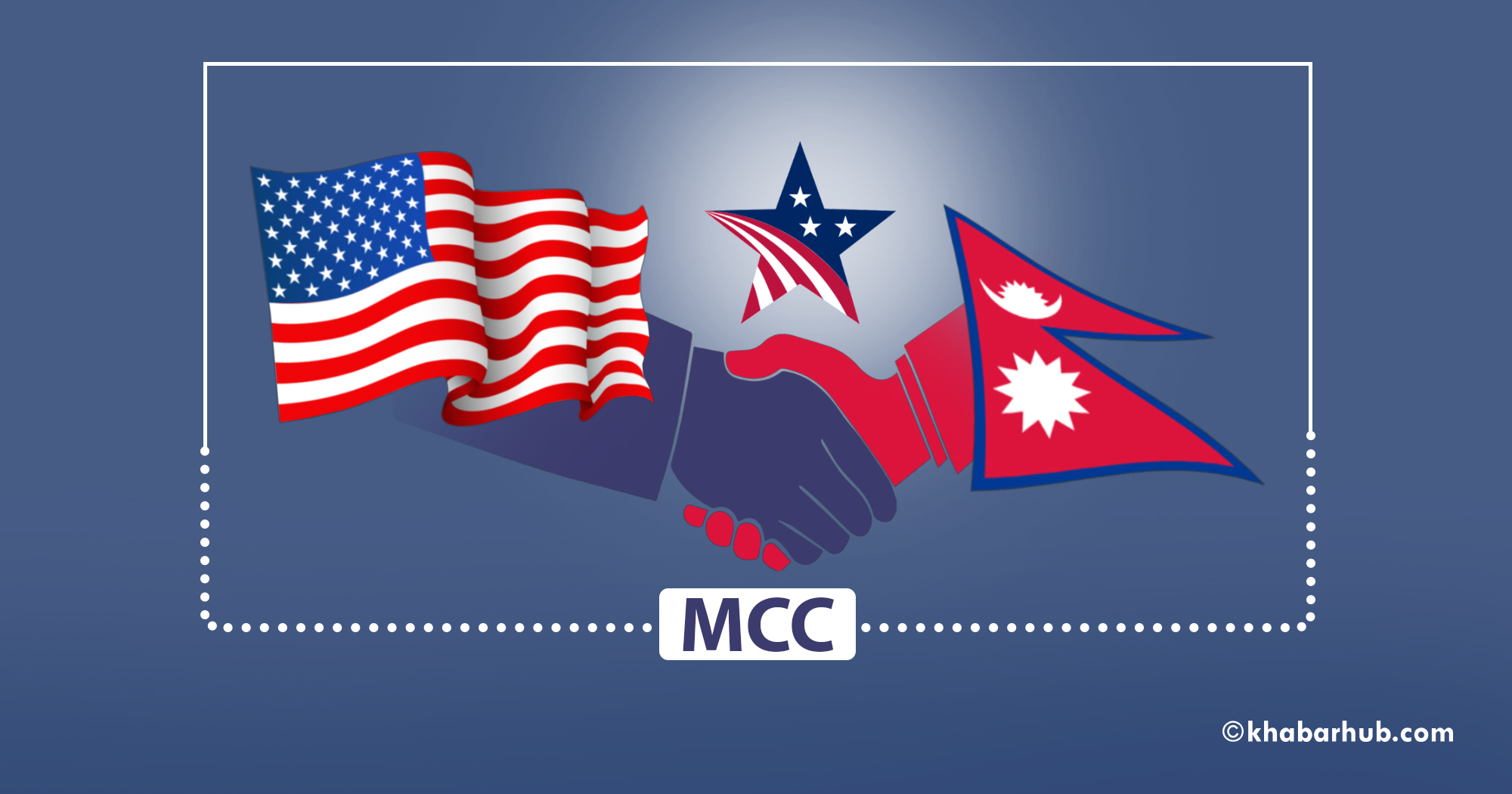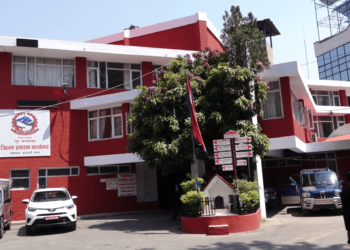KATHMANDU: Prior to the ratification of the Millennium Challenge Corporation (MCC) Compact, the dispute related to this development project has once again warmed the ground.
The provision of getting it ratified from the parliament so as to maintain the transparency and make room for successful implementation of this infrastructure-focused development project, the floors have been flooded with diverse opinions.
MCC has been made a means to prove one’s ‘patriotic’ personality and gain public attention. It has been few months since misconception and false details related to MCC have obsessed social media. More than the federal parliament proposed for discussion, the issue has filled the walls of social networks and media.
While the MCC Compact is confined to the drawer of parliament’s secretariat for months, a group of people has been busy provoking the public against the United States.
Disseminating provocative stories and content to stir up controversy, influencing the public opinion, make bias of issue, overlap facts, persuading people through emotional nationalist messages are some of such drives that are often followed by fake news ‘producers’.
Active misinformation used with dubious sources, intended to misinform, misguide and spread propaganda such news-generator creates hoax headlines, graphics and content. Most of the fake news has been spread through social media making it difficult to distinguish fake news and real for ordinary readers.
The news designed for petty political interests when used by some crooked intent minds seems to provoke anti-American sentiment.
When the self-declared experts and analysts obsess the wall-papers of media and screens, the genuine voices disseminating the authentic and realistic information are likely to be shadowed. The media coverage of these false presenters has submerged the genuine and authentic voices of the government of Nepal, the US Officials, the US Embassy in Kathmandu and many other people who have gone through the document thoroughly.
Disseminating provocative stories and content to stir up controversy, influencing the public opinion, make bias of issue, overlap facts, persuading people through emotional nationalist messages are some of such drives that are often followed by fake news ‘producers’.
Such scandal-mongers, knowing or unknowingly, have led the issue related to MCC to the extreme of getting the project closed or collapse.
The most thoughtful thing here is that provided the Compact is not ratified by the parliament, implementation plans may get adversely affected leading the packing off of the things and resources on ‘as it is where it is’ basis. In other words, the late ratification shall lead to the collapse of the program itself.
Baseless dispute
Some of the terms and conditions of the Compact are made the issues for dispute. The conditions like declaring the Transmission Line as the national pride project, formation of Electricity Regulatory Mechanism, provision of PIA between Nepal government and MCC, India’s consent to be sought in the expansion of Butwal-Gorakhpur Transmission Line, the Compact to be ratified by the parliament, etc. are made the issues for debate.
The US Official’s arrival in Nepal is misinterpreted as the attempts to put pressure on the government. Along with others, such baseless speculations have created lots of confusion endangering age-old US-Nepal relationship.
Despite frequent explanations from the concerned US agencies like the US Embassy and the US authorities, attempts have been made to regard MCC as an integral part of US military strategy and Indo-Pacific Strategy. Recently, in his exclusive interview with Khabarhub Jonathan Henick, Deputy Assistant Secretary for South Asia Affairs, Public Diplomacy and Press, dismissing speculations that MCC has links with the military strategy or any other affairs, clarified that there are no military or other strings attached to this grant.
He clarified that MCC is purely meant for the development of the Nepali economy, for the benefit of the Nepali people. Obviously, as Henick explained the US has no expectations that it would receive anything in return for signing on to this program.
Reiterating that the Compact has no other expectations, he said that in MCC there is absolutely no connection to any strategy or any other sectors, or military affairs, etc., no connection at all.
No provision in the compact says that Nepal’s auditor general’s auditing will not be held valid, rather it says the auditor should be an internationally recognized one. It’s remarkable that Nepal’s office of the Auditor General has been executing MCC Nepal/MCA Nepal’s auditing since 2017.
The provisions in the compact are ratified by US Congress, and it is mandatory for all countries willing to take the grant to ratify it from their parliament. All countries including the communist nation Vietnam accepted this provision. This is not a special provision meant for Nepal.
Regarding the rationale behind seeking India’s consent in the project, one has to understand that Nepal has to extend a 120 KM transmission line via India if it wants to sell electricity to Bangaladesh; even if it is to be sold to India it is not possible without India’s consent. This condition is practically essential, so the criticism makes no sense.
Patent right over intellectual property in the documents prepared for and during the implementation of the Compact in Nepal is another issue regarded as disputable. Actually, the compact says that the Nepal government can use the documents without any royalty and the patent right over the documents prepared under Nepal’s investment shall be of Nepal.
No provision in the compact says that Nepal’s auditor general’s auditing will not be held valid, rather it says the auditor should be an internationally recognized one. It’s remarkable that Nepal’s office of the Auditor General has been executing MCC Nepal/MCA Nepal’s auditing since 2017.
Actually, on October 15, a meeting held in Bangeloru of India, Nepal and India had agreed and signed an agreement making room for the export of electricity in Bangladesh. India and Bangladesh are the main prospective markets for the export of hydroelectricity so their consent will be beneficial for Nepal.
Nepal Electricity Authority has been saying that Nepal will have some surplus production in a few months from now, the Ministry of Energy has regarded management of this energy surplus as a challenge unless the market is sought instantly. The 400 KVPS transmission line shall link most of the hydro corridors like Budhi Gandaki, Kali Gandaki, Koshi, Marshyangdi, Trishuli, Tamakoshi, etc making the energy trade at international market possible.
On January 13, 2013, the Council of Ministers formed under Chief Justice Khila Raj Regmi had formed a special group of economists to identify the obstacles of development, whereas in Feb. 2015 during Sushil Koirala’s premiership MCC had informed Nepal about it Nepal’s selection for the program.
Some critiques even cite that the US can withdraw the agreement at any time, the cancellation can be initiated by any country at any time. All international contracts have such provisions, but, generally, the running compacts are not canceled or withdrawn.
Out of 47 compacts, MCC has signed since 2004, only 2 were canceled. The compacts in Mali and Madagascar were dropped untimely as those countries faced coup d’etat undermining rule of law and norms and values of democracy.
How was the agreement executed?
MCC compact was not signed in haste. The US had consented to the grant at the request of the government of Nepal. Six different government of Nepal had taken initiation for the compact. The US became ready to provide the grant after almost all major political parties agreed on the conditions. After various forms of dialogue and consultation, only the pact got its present form.
On June 1, 2017, during the premiership of Puspa Kamal Dahal, a dialogue team was formed. Krishna Bahadur Mahara, then Minister for Finance had taken lead to a request for the Compact then.
After being selected in Nepal threshold program, on January 19, 2012, then Prime Minister Dr Baburam Bhattarai and Minister for Finance Barsha Man Pun were informed about the progress made in the sector, which had resulted in the nomination of the then head of Foreign Aid Coordination Department as Information Officer to coordinate with MCC.
On January 13, 2013, the Council of Ministers formed under Chief Justice Khila Raj Regmi had formed a special group of economists to identify the obstacles of development, whereas in Feb. 2015 during Sushil Koirala’s premiership MCC had informed Nepal about it Nepal’s selection for the program.
On April 6, 2015, the government had appointed Krishna Gyawali, former Secretary, as the national coordinator of the program. Dr. Ram Sharan Mahat, then Minister for Finance, had formed the Board of Directors for MCC Compact then.
On September 14, 2015, the Koirala-led government had signed an agreement related to the feasibility study about the prospective projects.
Similarly, on July 19, 2016, during KP Oli-led government in which Bishnu Paudel was the Minister for Finance, the government had signed an agreement related to preparing the draft of the compact and the selection of prospective projects.
Then, on June 1, 2017, the Pushpa Kamal Dahal-led government had formed a talk team to hold dialogue which was initiated by then Finance Minister Krishna Bahadur Mahara.
Provided MCC is not ratified from the parliament making room for implementation, the patience of donors may not remain the same much longer. MCC leadership might deem the formal procedure it has to go through both in the US and Nepal as lengthy, tiresome and discouraging which can stain the relationship.
Similarly, the Sher Bahadur Deuba-led joint government which shared the government with Nepal Communist Party (Maoist) had delegated the authority to sign on MCC on behalf of the government, which was formally signed, as per the cabinet decision, on September 14, 2017, by Gyanendra Bahadur Karki, the Finance Minister then. Finance Minister Karki had signed on the Millennium Challenge Compact on behalf of the government of Nepal.
Is revision or amendment possible in the Compact?
Implementation of the Compact is mainly the responsibility of the Prime Minister now. PM KP Oli has made such commitment to formal and public forums as well. To request an amendment for the project which has gone through such a long procedure is like skipping one’s responsibility.
The nearly two-third majority government has to regard it as a national responsibility as well and should take necessary steps as failure to do so may make the international community skeptical about Nepali leaders’ decision-making capacity.
As the Compact is the result of a thorough study by the experts from both Nepal and the USA, there are no provisions that can have adverse impacts on the sovereignty, geographical integrity, nation’s independence and national security. Provided both parties feel further clarification is required in some of the clauses of the compacts, Nepal as a party can propose to sign an alternative document to address those issues keeping the main document intact.
MCC grant aid is not mandatory for the US government; neither is it imposed against Nepal’s will. Hence, failure to ratification will let the US take its grant back happily; so, more than thinking about the negative impacts on the US, one should think about the opportunity of making large investments in infrastructure development.
It should be kept in mind that long procedure of revision or amendment shall induce US to withdraw the compact, which is not against the conditions of the contract as well.
Provided MCC is not ratified from the parliament making room for implementation, the patience of donors may not remain the same much longer. MCC leadership might deem the formal procedure it has to go through both in the US and Nepal as lengthy, tiresome and discouraging which can stain the relationship.
Once the Compact is amended here it has to be taken back to the US Senate for re-ratification which is cumbersome and may even lead for rejection from the Senate.
More than searching for the possible errors and making a fuss about it (if any), it’s wise to make commitment not to misinterpret or misuse any terms and conditions. Provided decisions are made keeping the spirit of the compact in mind, bilateral trust, fraternity and harmony can get intense in the days to come.
Here we should ask ourselves, what’s our responsibility? Are we aware about the sensitiveness of external relations? How can we justify the cancellation or request for revision for the project when it has reached the implementation phase? What’s the motif behind cancellation or request for revision at this stage?
What can be its impact on the multidimensional bilateral relationship with the US? What message does it tell about the parliamentary system where the proposal for revision is not made by the people’s representative but the party leaders? Doesn’t it make a mockery of the parliamentary system we have been boasting about? Can Nepal’s credibility remain the same after such deals?
Abstaining the biasedness that colored our vision so as to see MCC as an integral part of military strategy, discussions should further focused on the key issues of the project. In a parliamentary system, decision should be made by people’s representatives in the parliament, not the party cadres who may not be literate enough in such issues.
Rather than seeking the flaws to make a mountain out of a molehill, the ways to patch up the cracks and utilize the deal for the nation’s best interest should be searched.
It seems the government is committed to making room for MCC implementation, but few people unaware of the impact of playing with such serious issues for their word games are making a fuss provoking anti-US sentiment in the country. Both the government and the responsible political parties should be aware of the forces trying to fish in muddy pool.









Comment